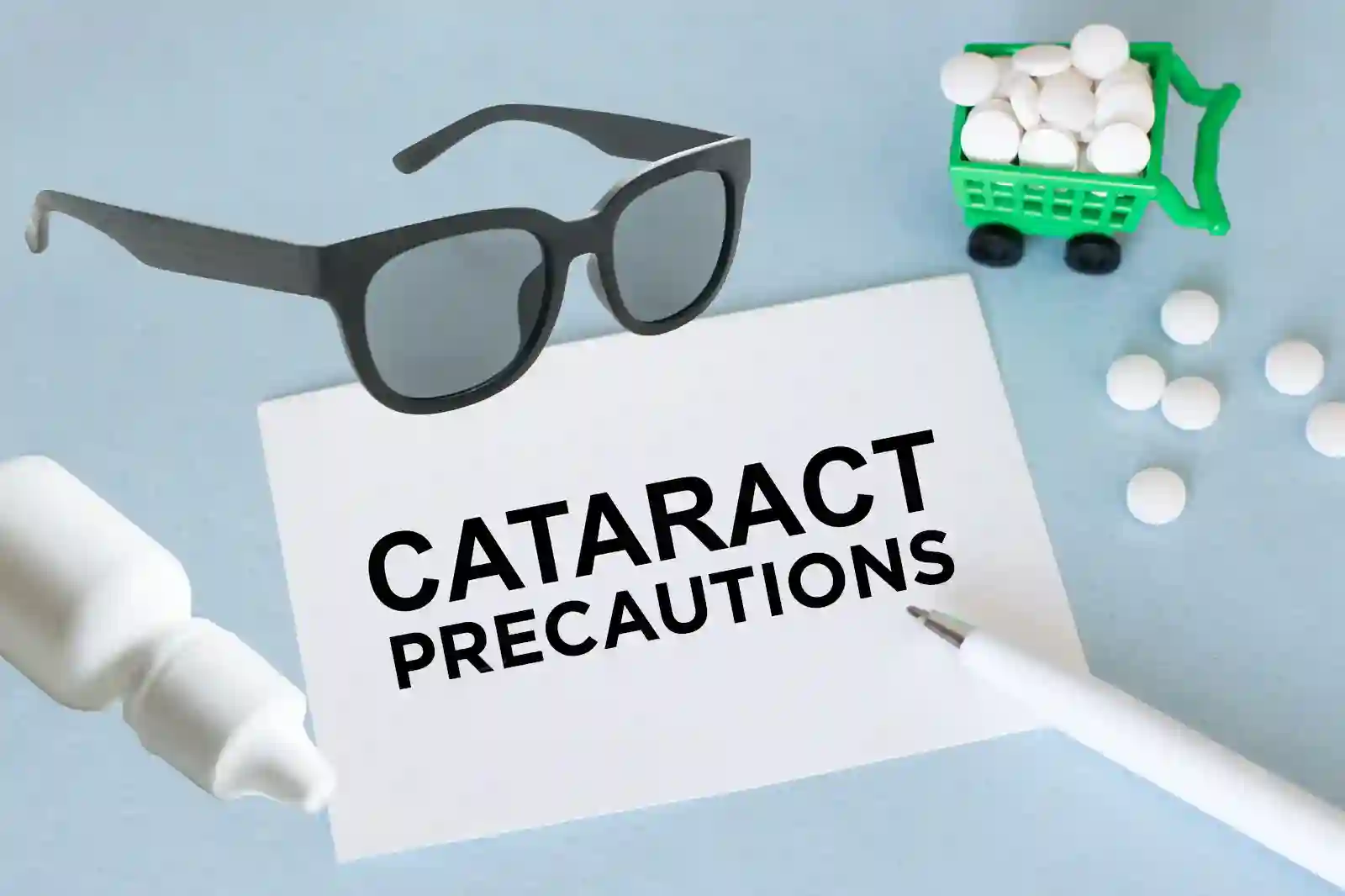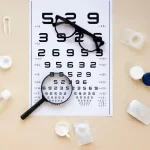|
Key Takeaways:
|
Cataract surgery is one of the most commonly performed procedures in ophthalmology and is generally considered safe and effective. However, the outcome of the surgery is not solely dependent on the procedure itself.
Following the correct precautions after cataract surgery significantly reduces the risk of complications and supports faster, smoother healing. Many postoperative issues, such as infections, inflammation, or delayed recovery, are preventable with proper care and awareness. This guide provides a detailed overview of cataract surgery aftercare, helping patients understand what to expect, what to avoid, and how to protect their vision during recovery.
What is Cataract Surgery?
Cataracts occur when the eye’s natural lens becomes cloudy, impairing vision. Cataract surgery involves removing this cloudy lens and replacing it with an artificial intraocular lens (IOL). While the surgery is typically completed within 30 minutes and often does not require an overnight hospital stay, the healing process spans several weeks.
Although the surgery itself is brief, recovery after cataract surgery occurs gradually over several weeks. During this time, the eye adjusts to the new lens and heals internally. Vision may fluctuate initially, and mild discomfort is normal. However, the way patients care for their eyes during this phase directly impacts long-term clarity and comfort.
Important Factors to Consider During Cataract Surgery
Adhering to postoperative instructions can significantly reduce the risk of complications such as infection, inflammation, increased intraocular pressure, or displacement of the new lens. In addition to preserving visual outcomes, proper care ensures patient comfort and speeds up recovery.
Many complications that arise after cataract surgery are preventable. Therefore, recognising the importance of post-surgical guidance cannot be overstated. Proper care begins immediately after the operation and continues through follow-up appointments.
Immediate Care in the First 48 Hours
The eye remains sensitive for 24 to 48 hours following surgery. Key precautions after cataract surgery during this phase include:
- Protecting the Operated Eye
A protective eye shield is placed immediately after surgery. This should be worn as advised, especially while sleeping, to prevent accidental rubbing or pressure on the eye.
- Limiting Physical Activity
Avoid bending forward, lifting heavy objects, or sudden movements. These actions can increase intraocular pressure and interfere with healing.
- Resting Correctly
Rest with your head slightly elevated using extra pillows. This helps reduce swelling and improve circulation around the eye.
- Avoiding Eye Contact
Do not rub, press, or touch the eye, even if it feels itchy or watery. Mild irritation is common and usually temporary.
Do’s and Don’ts After Cataract Surgery
Understanding the do’s and don’ts after cataract surgery helps patients avoid common mistakes that can slow recovery.
Do’s
- Use prescribed eye drops exactly as directed
- Wear sunglasses outdoors to protect from UV rays
- Keep follow-up appointments without fail
- Maintain good hand hygiene before touching near the eye
- Eat a balanced diet to support healing
Don’ts
- Do not swim or use hot tubs for at least 2–3 weeks
- Avoid eye makeup for a minimum of two weeks
- Do not drive until your doctor confirms it is safe
- Avoid dusty, smoky, or polluted environments
- Do not stop medications without medical advice
Following these do’s and don’ts after cataract surgery ensures a lower risk of infection and a more predictable recovery timeline.
Usage of Medication After Cataract Surgery
After cataract surgery, most patients are prescribed a course of eye drops. These medications serve various purposes—preventing infection, reducing inflammation, and controlling eye pressure. To maximise their effectiveness:
- Follow the dosing schedule strictly: Skipping doses can reduce the medication’s effectiveness.
- Wash hands before application: Maintaining hygiene minimises the risk of introducing bacteria to the eye.
- Do not share eye drops: Each prescription is tailored to an individual’s needs, and sharing can lead to cross-contamination.
- Consult your doctor before stopping: If the eye feels better, continue using the drops as prescribed unless advised otherwise.
Proper medication use is one of the most effective cataract surgery recovery tips and should be prioritised.
Tips for Eye Protection
After surgery, the eye becomes temporarily vulnerable to environmental factors. Adequate eye protection after cataract operation includes:
- Wearing sunglasses: Exposure to sunlight can cause discomfort and even damage the healing eye. Use UV-protected sunglasses when outdoors.
- Using an eye shield at night: This prevents accidental rubbing during sleep.
- Avoiding wind exposure: Consider staying indoors or using protective eyewear on windy days.
- Keeping the eye dry: Avoid direct water splashes into the eye, especially during bathing.
Protective measures should continue for at least a few weeks, depending on the patient’s progress and the physician’s advice.
Diet and Lifestyle Changes
While cataract surgery is localised to the eye, overall health influences recovery speed and comfort.
Nutritional Support
- Stay well-hydrated to maintain eye lubrication
- Include antioxidant-rich foods like leafy greens, citrus fruits, and berries
- Omega-3 fatty acids may help reduce dryness
Lifestyle Adjustments
- Avoid smoking and alcohol during recovery
- Manage chronic conditions such as diabetes or hypertension carefully
- Get adequate sleep to support tissue repair
A healthy lifestyle complements medical care and improves recovery outcomes.
Signs of Complications
Despite taking all necessary precautions after cataract surgery, complications may still arise. It’s important to recognise early warning signs:
- Persistent pain: Mild discomfort is expected, but ongoing or worsening pain is not.
- Sudden vision loss: Any dramatic vision change requires immediate attention.
- Redness or discharge: This could indicate an infection.
- Flashing lights or floaters: These might suggest retinal issues or posterior capsule opacification.
- Swelling: It doesn’t subside, could be a sign of inflammation or fluid buildup.
If these symptoms appear, do not wait for the next appointment. Contact your ophthalmologist immediately.
Follow-Up Care
Regular follow-up appointments help track healing and identify potential problems early. These visits often occur:
- Within 48 hours post-surgery
- One week later
- At one month, and possibly beyond
During the eye doctor visits, the eye will be examined for clarity, pressure, and placement of the IOL. Any adjustments to medication or lifestyle will be advised. These visits are essential, even if recovery seems smooth.
Long-Term Recovery
While initial healing occurs in the first few weeks, full recovery can take 6–8 weeks. During this time:
- Continue wearing protective sunglasses outdoors.
- Avoid high-impact sports or sudden jerky movements.
- Do not skip follow-up visits or taper off medications on your own.
- Maintain good eye hygiene and monitor for new symptoms.
Following comprehensive precautions after cataract surgery during this extended period ensures not just recovery but long-term visual health.
When to Seek Help?
Timely intervention can prevent minor concerns from becoming major problems. Seek immediate medical attention if you experience:
- Sharp or stabbing eye pain
- Sudden blurriness or black spots in vision
- Light sensitivity or glare
- Increasing redness
- Feeling like something is stuck in your eye
Your ophthalmologist is your best resource for assessing any postoperative symptoms.
Conclusion
Recovering from cataract surgery involves more than the procedure itself. Observing the proper precautions after cataract surgery enhances your chances of a smooth, complication-free recovery. From avoiding risky activities to wearing appropriate eye protection, each step ensures your eyes heal properly and comfortably. Staying informed and vigilant, and regular follow-ups form the backbone of successful post-surgical care. Always consult your ophthalmologist for personalised advice and promptly report any unusual symptoms.
FAQs
When can I see a change in my Vision after cataract surgery?
Many patients claim that their vision becomes clear only a few hours after the cataract surgery. You may find that it takes a week or two before you see the world around you with clarity once more.
Why is post cataract surgery precaution essential?
Post cataract surgery precautions are vital for a successful recovery. They prevent infections, ensure proper healing, and reduce inflammation. Following these precautions safeguards the eye, minimizing complications and enhancing visual outcomes.
Why do I have watery eyes after my cataract surgery?
Watery eyes after cataract surgery can be due to irritation, temporary tear imbalance, or inflammation. It’s often a temporary issue and improves as the eye heals. If not, then consult your ophthalmologist.
What Foods to have and avoid after Cataract Surgery?
As one of the precautions to be taken after Cataract surgery, here is the list of foods to take and avoid after the operation.
- Foods to have: Hydrating foods, fruits and vegetables, lean proteins, whole grains, Omega-3-rich foods, dairy products for calcium & vitamin D.
- Foods to avoid: Spicy foods, caffeine and alcohol, sugary & processed foods, fatty & fried foods.
*Always follow your doctor’s specific dietary recommendations for your recovery.
Is it normal to have blurry vision after surgery?
Mild blurriness is common and typically improves within a few days. If it persists or worsens, contact your doctor.
How long does recovery after cataract surgery usually take?
Most patients recover within four weeks, though vision stabilises fully by eight weeks.
What precautions after cataract surgery are most important initially?
Avoid eye rubbing, heavy lifting, water exposure, and unprescribed physical strain.
When can I resume normal activities after cataract surgery?
Light activities resume within days; strenuous exercise usually after three to four weeks.
Are eye drops mandatory during cataract surgery aftercare?
Yes, prescribed drops prevent infection, reduce inflammation, and support proper healing.
What symptoms indicate complications after cataract surgery?
Persistent pain, vision loss, redness, flashes, or discharge require immediate evaluation.





